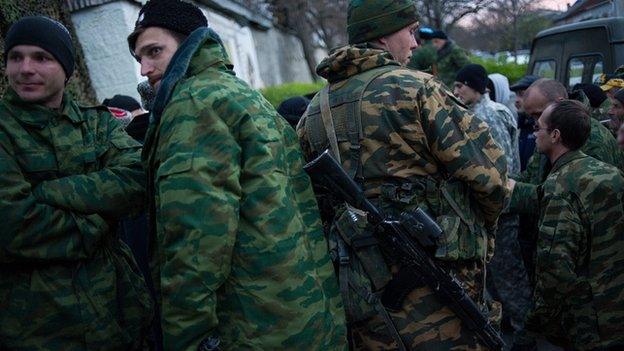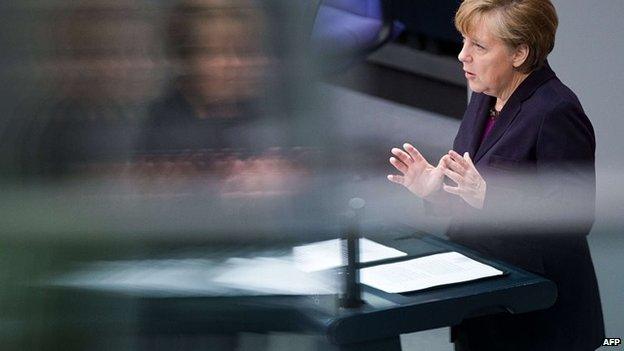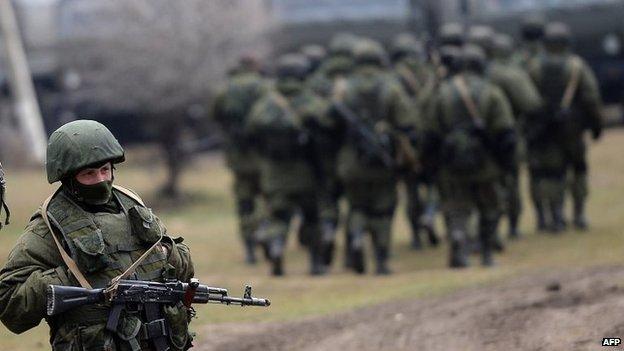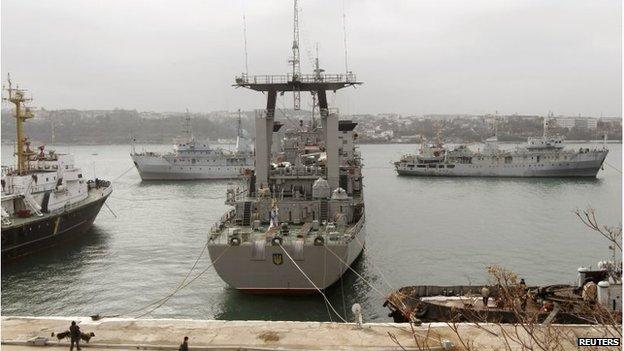Crimea crisis: Merkel warns Russia faces escalating sanctions
- Published

Crimean pro-Russian forces seized two naval bases on Wednesday
European Union leaders are gathering in Brussels to discuss their response to the crisis over Crimea.
The British Prime Minister David Cameron said more names would be added to the list of those facing travel bans and asset freezes.
German Chancellor Angela Merkel said the EU would be ready to impose economic sanctions against Russia if there were an escalation.
Crimea remains tense after its leaders signed a treaty to join it to Russia.
French President Francois Hollande said a summit planned for June between the EU and Russia would be cancelled. He described the events of the past weeks as "unacceptable".
Mr Cameron said the countries of the European Union needed to speak with a clear and united voice.
The treaty signed by Crimean leaders with Moscow on Tuesday absorbs the peninsula - an autonomous republic in southern Ukraine - into Russia, following a referendum which the West and Kiev say was illegal.
The treaty has now been approved by Russia's lower house of parliament - the Duma - and is expected to be ratified by the upper house on Friday.
Speaking ahead of the vote in the Duma, Russia's Foreign Minister Sergei Lavrov described possible sanctions as "illegitimate" and "not based on international law".
Mr Lavrov said the treaty with Crimea would "be a turning point in the fate of the multi-ethnic peoples of Crimea and Russia, who are linked by the close ties of historical solidarity".
He reiterated Moscow's position that the annexation is necessary to protect ethnic Russians from "nationalists, anti-Semites and other extremists on whom the new [Ukrainian] authorities depend".
In a resolution on Thursday, Ukraine's parliament said the country would "never and under no circumstances end the fight to free Crimea of occupants, no matter how difficult and long it is".
'Political consequences'
The United Nations chief, Ban Ki-moon, told Russian President Vladimir Putin that he was "deeply concerned" over the crisis.
Mr Ban was holding talks with the Russian leader before travelling to Kiev.
Western leaders have denounced Russia's actions in Crimea as a violation of Ukraine's sovereignty and a breach of international law.

Angela Merkel said the political context was no longer right for Russia to be part of the G8

Pro-Russian troops have surrounded military bases, including here at Perevalnoye outside Simferopol

Ukraine's battleship Slavutich remains blocked in by Russian ships in the harbour at Sevastopol
The EU has already imposed sanctions on 21 people connected to Moscow's intervention in Crimea, and is expected to discuss expanding the sanctions to include political and military figures close to President Putin.
Speaking in Berlin before travelling to Brussels for Thursday's summit, Mrs Merkel said the EU would "make clear that we are ready at any time" to increase sanctions against Russia "if there is a worsening of the situation".
The EU would also, she said, "draw consequences for political relations between the EU and Russia, as well as for relations between the G7 and Russia".
Mrs Merkel told German MPs that the current political situation also meant the G8 effectively no longer existed.
The G8 - comprising seven of the world's leading industrialised nations, and Russia - is scheduled to hold a summit in the southern Russian city of Sochi in June.
But Mrs Merkel said it was "obvious, as long as the political context for such an important format like the G8 does not apply, as is the case at the moment, the G8 doesn't exist anymore, neither does the summit nor the format as such".
Tanya Beckett reports
The US has also ordered a freeze of assets and travel bans on 11 individuals, and has said it is considering expanding these.
In other developments:
Russia has reportedly taken control of a confectionery factory in Lipetsk, Russia, owed by Ukrainian tycoon Petro Poroshenko. He was a key supporter of the protests against President Viktor Yanukovych
President Barack Obama ruled out military involvement in Ukraine, saying the US "does not need to trigger an actual war"
Ukraine's ambassador to the UN, Yurii Klymenko, told diplomats in Geneva there are "indications that Russia is on its way to unleash a full blown military intervention in Ukraine's east and south". Russia dismissed the warning
Crimea's PM says a 17-year-old Ukrainian has been arrested over an incident in Simferopol on Tuesday in which a Ukrainian soldier and a member of the pro-Russia self-defence force were killed
Redeployment
The crisis comes nearly a month after Ukraine's pro-Russian President Viktor Yanukovych was replaced by Western-leaning interim authorities.
Pro-Russian troops took control of Crimea in late February.
At least two bases - in Sevastopol and Novo-Ozyorne - were taken over by pro-Russian forces on Wednesday.
Ukraine has said it is drawing up plans to withdraw its thousands of soldiers and their families from Crimea for their own safety, and redeploy them on the mainland.
A number have already accepted Russia's offer to change sides, but many are still in their bases refusing to surrender.
